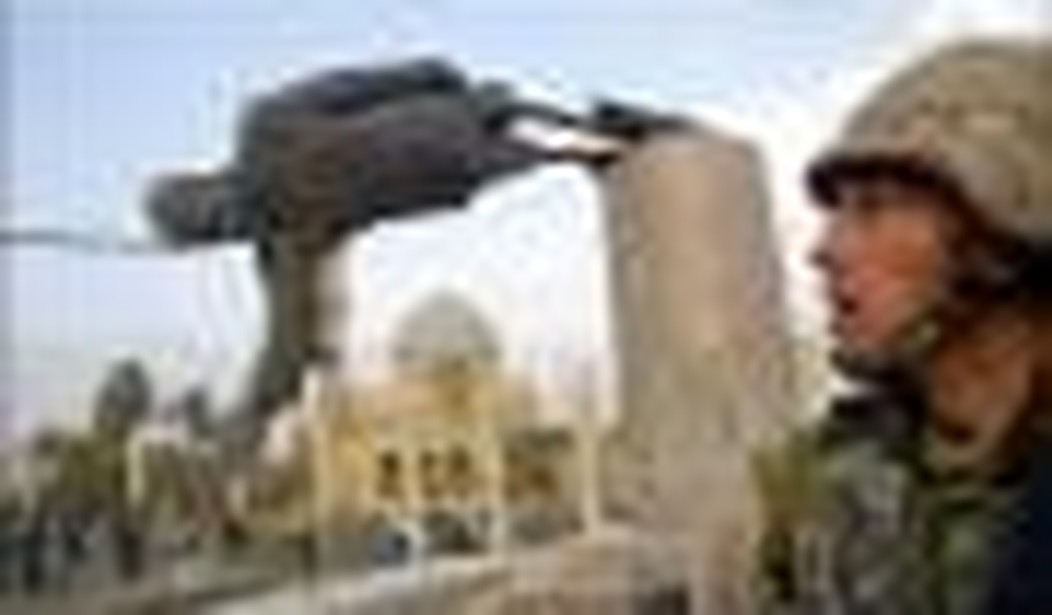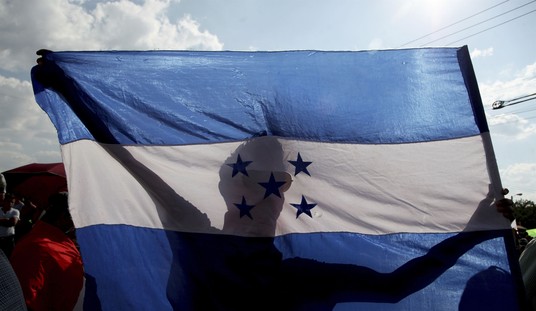Ponder for a moment a hypothetical past: it is late 2002 and the United States announces it is ending its buildup of military personnel in Kuwait. Several months later, President George W. Bush decides against abrogating the Ba’athist regime. Weighing the pros and cons of such an adventure, President Bush’s closest advisors counsel not to intervene in “internal Iraqi affairs.”
Envision this scenario, where once more, somehow, Saddam Hussein had managed to survive.
Those of us who championed Hussein’s removal — particularly those of us who haven’t served in Iraq and who have not endured personal sacrifices — routinely go through a similar intellectual exercise within our own minds (at least, I shall speak for myself).
It is a sobering thing to verbally defend the wisdom behind an action which has directly led to the death of tens of thousands of innocents and thousands of fellow citizens, an action which has lasted far longer than most had expected, generating more casualties than most had anticipated. It is an exercise which encompasses all parameters of introspection, probing into intentions and consequences, as well as the justification and necessity of actions undertaken.
The Iraq battle — part of the much larger, regional Long War which ensues to this day — is now, thankfully, reaching something resembling an end. Through grit and perseverance, it seems as if we will end up on the winning side.
All of this raises the question: disregarding one’s initial support for, or opposition to, the decision to go to war, knowing what we now know, if you could … would you take it all back?
This sort of theoretical question requires some elaboration. How much power can we wield, here? Is it a “mulligan” we are permitted to undertake? I know of not a single person who favored the war that would not take up the opportunity to have a do-over intervention, granting our policymakers the chance to avoid the mistakes they may have shortsightedly advocated in 2003-04 — only to fully appreciate the error of their procedures in 2005-06 (the WMD fiasco, setting up the CPA, not stopping the looting, an insufficient postwar effort, inadequate troop levels, the state of the infrastructure, ignoring Iranian meddling, the first flight from Fallujah, the initial pardon given to Sadr, Abu Ghraib … must I continue?).
Or is this ultimatum a matter of either taking down Saddam’s twisted lunacracy or allowing it to live on unfettered? Considering this is the more pressing choice, this theoretical circumstance should be the basis of our question.
It seems as if this is more a matter of preference than justification. It is certainly fair to suggest that had the war gone smoother — had it ended weeks, not years, after it began — more Americans, despite whatever merits they thought the war lacked, would presently view the decision to go to war in a more favorable and justifiable light. But why is this so?
Surely an easier experience would have altered how preferable we would have viewed the conflict. But what does difficulty or easiness have to do with objective justification? Why do we allow, however subconsciously, the simplicity of an event to modify how we judge its validity?
Invading Barbados or Saint Lucia would invariably be easier — fewer casualties and in quicker time — than a military confrontation with, say, North Korea or Sudan. Difficulty reveals nothing about the morality of an action. Some of the bloodiest battles throughout our history have been our most necessary and momentous.
Nevertheless, it is fair to encourage opponents of the intervention to go through the same process of contemplation and to make peace with their own intellectual quandaries as well.
Precisely what — they should all be asked, as we ask ourselves — do they feel would have happened had the U.S. opted not to overthrow Saddam six years ago?
There are only two major possibilities: either something continues to exist or it ceases to exist. Either the “presidency” of Saddam Hussein, if left unchecked, would have continued on — or his rule would have imploded under the weight of both external and internal forces.
The point should be made that either scenario would have opened up a Pandora’s Box of likelihoods, few of which were pretty. Whether or not the regime had lived on with continuity or if it had crumbled to smithereens, the consequences would have been highly problematic, mandating international assistance and intervention regardless.
Even if we were to overlook the obvious doomsday possibilities — I know it is a sin to mention the words “Saddam Hussein” and “terrorist attack” in the same sentence — the continuation of Hussein’s rule would have posed serious predicaments for future U.S. administrations. Hussein was becoming ever more deranged, seeking out jihadist groups with which to cooperate — from Algeria to the Philippines — and was showing no signs that, in his old age, he would have a sudden “death-bed conversion,” to paraphrase Bill Clinton.
The various bipartisan reports and congressional commissions we now have the luxury of reading — the David Kay, Robb-Silberman, and Charles Duelfer reports, the Institute for Defense Analysis investigation, etc. — all conclude that while the Iraqi regime may not have had stockpiles of unconventional weapons at the time of our intervention, the highest levels of the Ba’athist government, particularly Saddam, maintained the capacity, the infrastructure, the desire, and the intent to reconstitute all WMD programs, including nuclear, once international sanctions were lifted — which was likely to happen by 2005.
So we can draw one such conclusion: today, Saddam would have likely been four years deep in pursuing the deadliest weapons in the world. These were weapons he alone had already used, and this was an elusive nuclear program he had tried to reconstruct for many years, after being thwarted in 1981 and 1991.
Rather than have an infant parliament in Baghdad, with hundreds of thousands of Iraqi servicemen fighting theocrats and terrorists across their territory, we would still have had to deal with a dictator’s malevolent aims. And while pacifying post-Saddam Iraq has constituted a large fixation of our resources and attention since 2003, a Saddamist Iraq in 2009 — free of sanctions and inspectors, void of no-fly zones, gaming billions out of the UN’s Oil-for-Food Program, transferring near-trillions in profit into subsidies and weaponry for terrorists — would have been an equally significant and dangerous, albeit different, preoccupation of ours.
It would have amounted to an unsolved dilemma, and the risks of the Iranian nuclear program would have been underscored if the world had to deal with similar nuclearization in neighboring Iraq — where Saddam’s stated primary rationale for nuclear prestige rested on warding off his feared Persian rivals.
When President Obama speaks about Iran “being contained” during the years of Saddam, he thinks he’s found his diamond-in-the-dunghill argument. But this geopolitical logic comes straight out of the Kissingerian playbook, where “realists” argue that the U.S. could have “played off” Iran versus Iraq, and vice versa. Of course, such realpolitik never offered a progressive vision for the region. We had been there and done that.
With all this said, the end of Saddam Hussein, occurring at a moment and in a way outside of the world’s control, would have been equally problematic. International sanctions were crippling Iraq’s economy, not to mention the utter destruction they caused to Iraqi civil society.
In order to be a surviving subject in what was Hussein’s police state, Iraqis of all stripes turned inward to their most basic attachments of locality: the tribe, the sect, the sheikh. It was a Hobbesian world, where people watched what they said and to whom, where neighbors ratted on their neighbors, where citizens looked over their shoulders and worried about their environs. In order to survive, you had to distrust. In a police state like this, a lack of suspiciousness, even of one’s own kin, would get you killed.
Visualize what would have happened if Saddam had fallen and all this had been left unchecked: no interim Iraqi governing council, no Paul Bremer, no CENTCOM, no Marine Corps. Just anarchy. What would have become of Iraqi oil fields? What would have become of Iraqi polity? What would have become of the Iraqi people themselves?
The Iranians, Syrians, Saudis, and al-Qaedists all had their shot in Iraq with a considerable coalition presence. What would have happened had they all been granted a free shot without such a presence?
Either Iraq, as we know it, would have devolved down into a permanent state of militia rule, Iranian-stoked sectarianism, ex-Ba’athist assassinations, and confessional, ethnic murder — or the sadistic Uday Hussein would have succeeded his father, free of sanctions, and with total commitment to pursue nuclear weaponry into this upcoming decade.
Considering these various alternatives — all of which would have mandated American intervention regardless — the decision to topple Saddam in 2003 was the right one. To intervene at a time and in a way of our choosing was prudent and necessary, despite the tragic cost in blood and treasure.









Join the conversation as a VIP Member